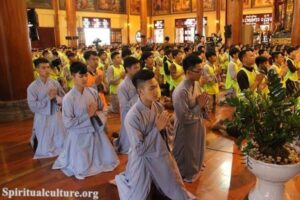This significant event is observed by Buddhist monks worldwide, symbolizing a time of intense meditation, reflection, and spiritual growth. Pavarana Day, celebrated on the full moon of the eleventh lunar month (usually October), is a day of great significance for the Buddhist community. This article will delve into the essence of Pavarana Day, its rituals, significance, and history.
Understanding Pavarana Day
Pavarana Day, in English, translates to ‘Invitation Day.’ It is a day when Buddhist monks invite each other to provide feedback and constructive criticism about their behavior. This practice is based on the Buddha’s teachings about the importance of maintaining harmonious relationships within the Sangha (monastic community). The day is marked with profound humility and respect, reflecting the Buddhist principles of self-improvement and spiritual growth.
Historical Context of Pavarana Day
The tradition of Pavarana Day dates back to the time of the Buddha himself. According to Buddhist scriptures, the Buddha and his disciples would retreat during the rainy season to meditate and focus on their spiritual growth. This three-month period is known as Vassa, and Pavarana Day marks its conclusion. The Buddha encouraged his disciples to use this day to invite their peers to point out any faults they may have observed during Vassa. This practice aimed to foster a culture of mutual respect, humility, and continuous self-improvement within the monastic community.
The Meaning of Pavarana Day
Pavarana Day holds immense significance in the Buddhist tradition. It represents the culmination of a period of intense spiritual focus and self-reflection. The invitation to receive feedback is a testament to the Buddhist principles of humility and self-improvement. It encourages monks to reflect on their actions and behaviors and strive to improve themselves continuously.
Moreover, Pavarana Day is a celebration of the monastic community’s unity and harmony. It serves as a reminder of the importance of mutual respect and understanding in maintaining a harmonious community.
Celebrating Pavarana Day
The celebration of Pavarana Day varies among different Buddhist traditions. However, the central theme remains the same – a gathering of the Sangha to invite feedback. The day typically begins with the recitation of the Patimokkha, a set of rules for monastic discipline. Following this, monks invite each other to highlight any observed faults, promising to accept the feedback with grace and humility.
In some traditions, Pavarana Day is also marked by a Kathina ceremony, where laypeople present robes and other necessities to the monastic community. This act of generosity is a significant part of the celebration, fostering a sense of unity and mutual support between the monks and the lay community.
Pavarana Day is not just a day of celebration but also a day of reflection. It encourages individuals to introspect, learn from their mistakes, and strive for continuous self-improvement. It embodies the essence of Buddhism – a journey towards enlightenment, marked by humility, respect, and mutual support.
In conclusion, Pavarana Day is a significant event in the Buddhist calendar, marking the end of the Vassa period and celebrating the principles of humility, self-improvement, and community harmony. Whether you are a practicing Buddhist or simply interested in understanding more about Buddhist traditions, Pavarana Day offers valuable insights into the rich tapestry of Buddhist culture and philosophy.




